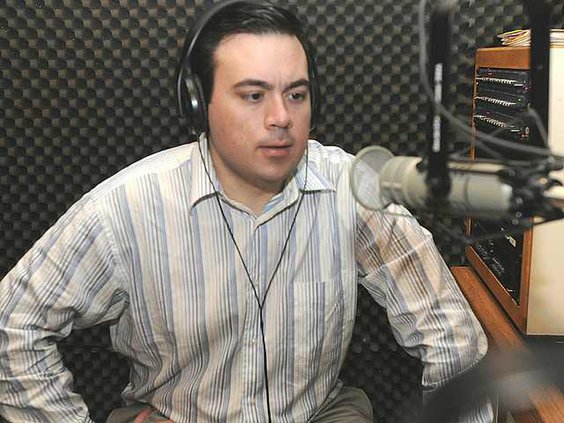Paul Leslie has a weakness for good music and meaningful conversations. For the last eight years, he’s been able to combine the two into a single format, his radio show, "The Paul Leslie Hour." For the last three months, it has been filling local airwaves on WBCX 89.1-FM, operated by Brenau University. Over the years, Leslie has interviewed people like director Woody Allen, poet Maya Angelou and singer Don McLean of "American Pie" fame. When he first started in the business, Leslie had a very simple objective. "I wanted to have a radio show that would play music and also have interviews with people I thought were interesting," Leslie said. "Steve Huntington was a program director and had a radio station down in Florida called ‘Radio Margaritaville.’ I sent him a CD of one show as a demo and he aired it. After that, I was hooked." Even though he enjoys holding an audience with well-known celebrities, he says some of his favorite interviews have been with people who have spent less time in the spotlight. "Probably my favorite interview of all times was with a lyricist named Marty Panzer. He wrote ‘Through the Years’ for Kenny Rogers and he wrote a lot of songs for Barry Manilow," Leslie said. "He was an incredibly interesting guy. I have never received more emails from people than when I had him on. He was really touching to people. He connected to people." Leslie’s weekly broadcasts can be heard at 7 p.m. Mondays. His interview style is akin to sitting on your front porch and chewing the fat with a neighbor. Except there are musical interludes. "You’re going to get to the essence of a person. I think I ask questions that are simple, but they reveal a lot about a person," Leslie said of his interviews. "If it’s a musician, you’ll hear an interview with them and then their music. If it’s not a musician, you’re gonna hear the story of (that person’s) life told through music as well as their interview." To make contact with potential interview subjects, Leslie usually does it the old-fashioned way: He writes a letter. He says it adds a personal touch that can be lost in an email. "I want to make the experience personal from beginning to end, so I make sure my letter is heartfelt and that I stay true to myself," Leslie said. "I’ve found that people can tell when you’re genuine and sincere." That level of authenticity is something he works to maintain throughout his broadcast, even if that means dusting off the vintage vinyl. "We may be one of the only radio shows that still plays vinyl records, but we play CDs, too," Leslie said. "My radio show has learned to adapt to technology. I think Bob Dylan said it best, ‘You better start swimming, or you’ll sink like a stone.’ We can say we liked it better one way, but the times, they are changing." Another way that he’s adapting to change is by posting his interviews online on YouTube, which allows him to reach listeners worldwide instead of being limited by the airwaves of his host stations. Although his show is broadcast out of Gainesville, Leslie will go the distance to have a face-to-face interview. "I don’t mind talking on the phone, but I feel like something’s lost there," Leslie said. "I prefer whenever possible to have the artist come into the studio. But I like to go where the artist is even better because they’re comfortable and more relaxed in their own environment." Even though he had previously interviewed rock ‘n’ roll legend Fats Domino, Leslie says it was their second encounter in 2009 that provided one of his favorite interview locations. The meeting came after Leslie walked to New Orleans from Georgia to raise money for charity. "We’re sitting there talking in his living room. There were gold records all over the walls and we were sitting on this pink couch that looked like a pink Cadillac," Leslie said with a grin. "I asked him a few questions and then we started to sing together. Being in Fats Domino’s living room, singing with him and drinking a beer together. That was something." Another memorable meeting occurred earlier this year when Leslie traveled to California to interview Elliot Mintz, whose interview style influenced Leslie greatly. "He’s a Hollywood publicist now, but the reason I knew him was because he did the radio show called ‘The Lost Lennon Tapes.’ He was a really good friend of John Lennon," Leslie said. "I went to the very top of Beverly Hills to interview him. I remember going all the way up the hills of Mulholland Drive, something I’ve seen in so many movies. It probably wasn’t the most interesting place, but that was the most memorable because he was someone who’d made such an impression on me. To be invited into his home was thrilling to me." Although people regularly reach out to Leslie to get a spot on his show, he still enjoys tracking down elusive subjects. "I still like the hunt. Nothing excites me more than when I find out somebody doesn’t give interviews," Leslie said. "The first series I did for WBCX was on the people who played with Paul McCartney. I found out that Wix Wickens, who is his musical director, doesn’t really do interviews. He has played with McCartney longer than anybody in The Beatles and anybody in Wings.
"I contacted McCartney’s office, told them I’m doing these interviews with his band when he’s in Atlanta and asked them to give a letter to (Wickens)." His dedication paid off; Wickens agreed to the interview. "When I decide to interview someone, it’s because something they’ve done has touched me. It’s personal," Leslie said. "I think the reason people like the show is because it’s personal and it’s soulful. I’m trying to bring humanity to people."
Brenau radio host brings big names to Gainesville airwaves

